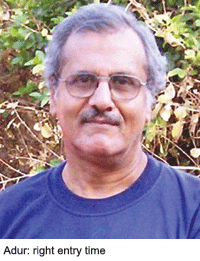There’s no dearth of employment opportunities for qualified astronomers in government organisations, research institutes, 40 planetaria across the country, observatories, museums, colleges and universities
For those interested in unravelling the mysteries of the universe, career options in the science of astronomy are aplenty, with demand for astronomers far outstripping supply. In newly liberalised and deregulated India, the study of astro-nomy could prove highly rewarding, both intellectually and monetarily.
The word astronomy literally translates into ‘law of the stars’. Astronomy is the science of celestial objects (stars, planets, comets and galaxies), phenomena that originate in the Earth’s atmosphere (such as auroras) and cosmic microwave background radiation. Broadly, it is concerned with evolution, physics, chemistry, meteorology and motion of celestial objects, as well as the formation and development of the universe. A career as an astronomer primarily entails research and teaching.
The academic training required to qualify as an astro-nomer requires a sound grounding in basic sciences, particularly physics and mathematics. In higher education, the study of electronics — analogue and digital — is necessary. This academic background is crucial to enable researchers to make obser-vations using existing telescopes and instruments, and also innovate and develop state-of-the-art astronomy equipment.
Ideally, aspiring astronomers should enrol for a B.Sc in physics or maths after Plus Two. For careers in instrument-ational/experimental astronomy, a bachelor’s degree in electrical or electronic engineering would be the best preparatory qualification. Several Indian universities offer Masters degrees in various fields of astronomy such as celestial mechanics, astrophysics, galactic astronomy, astrochemistry etc.
Individuals with Masters degrees and Ph D qualifications are welcomed by the Tata Institute of Fundamental Research (TIFR), Mumbai; Inter-University Centre for Astronomy and Astrophysics (IUCAA), Pune; National Centre for Radio Astrophysics, TIFR (Pune); Indian Institute of Astrophysics (IIA), Bangalore; Raman Research Institute (RRI), Bangalore; Aryabhata Research Institute of Observational Sciences (ARIES), Nainital; Physical Research Laboratory, Ahmedabad; and Space Science Centre, ISRO, Thiruvantha-puram. However, their selection criteria differ and some administer an entrance test followed by an interview. Aspiring astronomers and space scientists also have the option of signing up for the 12-month joint astronomy programme of the Indian Institute of Science (IISc), Bangalore jointly designed with IIA, RRI and TIFR, Mumbai, which offers the prospect of enroling in a Ph D programme on completion.
On completing their first research assignment, aspiring astronomers are usually absorbed as research scientists on start-up remunerations of around Rs.40,000 per month, which can go up to over Rs.100,000 as there’s no dearth of employment opportunities in numerous government organisations and research institutes, 40 planetaria across the country, observatories, museums, colleges, universities and miscellaneous private institutions. Moreover globally-reputed institutions such as Unesco and NASA also employ astronomers, offering handsome compensation packages. And the demand for astronomers has spiralled further with India’s space programme on a roll.
 “The future of astronomy in India is very bright and this is the right time to enter this exciting profession, which is experiencing a 40 percent shortage of qualified astronomers. We have the latest telescopes and instruments, but unfortunately not enough people to use them,” says Bharat Adur, a reputed astronomer who worked with the Nehru Planetarium, Mumbai for 21 years, before resigning in 2005 to co-promote Akash Ganga Centre for Astronomy, Badlapur to propagate and teach astronomy.
“The future of astronomy in India is very bright and this is the right time to enter this exciting profession, which is experiencing a 40 percent shortage of qualified astronomers. We have the latest telescopes and instruments, but unfortunately not enough people to use them,” says Bharat Adur, a reputed astronomer who worked with the Nehru Planetarium, Mumbai for 21 years, before resigning in 2005 to co-promote Akash Ganga Centre for Astronomy, Badlapur to propagate and teach astronomy.
With an interest in the study of space, galaxies and stars while still a school student, Adur graduated in physics and maths from the Institute of Science, Mumbai and pressed on to acquire a Masters in nuclear physics from the institute in 1979. To study astronomy, he signed up for a certificate programme of the Lyon Observatory, France (1981-83) and did a stint with the Dublin Observatory, Ireland where he worked on minor bodies (asteroids) for a year. After returning to India in 1984 he joined Mumbai’s Nehru Planetarium as a senior specialist, where he introduced observa-tion of astronomy events such as solar eclipses and planetary movements, presented shows in English, Hindi and Marathi and did some teaching.
The Akash Ganga Centre for Astronomy at Badlapur, co-founded by Adoor with 11 like-minded and committed astronomers, has evolved into an open platform, admitting members from any discipline. The basic qualification for admission is a class XII school leaving certificate.
“We’re propagating the ever-evolving science of astronomy to all interested in the subject. The response is excellent and I’m happy making a positive contribution. People trained by us are quickly absorbed by government institutions, corporates and research institutes,” says Adur.
Indra Gidwani (Mumbai)